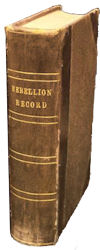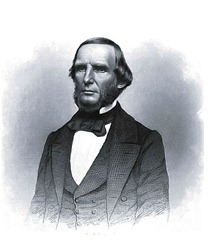
—General Banks issued a proclamation announcing the arrest of Charles Howard, William Getchell, John Hincks, and John W. Davis, late members of the police board of Baltimore, and giving his reasons therefor.— (Doc. 62.)
—This afternoon Lieutenant Yelverton and eighteen men of the Seventh New York Volunteers, made a reconnoissance from Newport News, Va., up the James River road to within a mile and a half of Great Bethel. At that point they came upon five of the rebel pickets, who precipitately fled, leaving behind, with other trophies, their hats and coats, which showed that the owners were officers. In the pockets of the hitter were several letters just finished, giving a complete account of the late advance of 2,800 men from Yorktown to attack Newport News. One of an amusing character from the pocket of James Steele, bookseller, Richmond, describes the federal troops as a set of baboons, to be speedily driven from the sacred soil of Virginia.—N. Y. Evening Post, July 3.
—Edward Clark, the Governor of Texas, issued a proclamation, in which he said: “It will also be treasonable for any citizen of Texas to pay any debts now owing by him to a citizen of either of the States or Territories now at war with the Confederate States of America.—National Intelligencer, July 3.
—Fifty Home Guards under Captain Cook, from De Soto and Hopewell, Mo., proceeded last night by rail to Irondale, where they arrived this morning at 9 o’clock, and marched towards Farmington in search of contraband arms, &c., reported to be in the neighborhood of that place. They passed through Farmington about three miles eastward towards the river, but finding nothing, were returning home, when about six miles west of Farmington, they were attacked by a body of some 250 to 300 well armed and mounted secessionists, who were in ambush. Their fire was returned by the Homo Guards, mortally wounding Win. Hunter, one of the secession leaders. The Home Guards returned to De Soto without the loss of a man or a gun.
The rebels in that section are in possession of artillery, and gathered their clan by the discharge of their cannon, and were rallying all their forces in anticipation of the return of the Home Guards. The brave 300 were concealed in the brush, and fired upon the Home Guards in an open field.—Missouri Democrat, July 3.
—The marine artillery of the First Rhode Island Regiment left Washington, at night, by rail; destination unknown.—The Third Massachusetts Regiment moved from the encampment within Fortress Monroe, to occupy a position between Hampton and Newmarket Bridge. Col. McChesney’s Regiment (N. Y.) took the place of the Third Massachusetts.—N. Y. World, July 3.
—The Governor of Tennessee stationed an agent at Mitchellsville, on the Louisville and Nashville Railroad, near the northern Tennessee line, to prevent goods declared contraband in the southern confederacy from coming north.—Louisville Journal, July 2.
—James M. Sanderson assumed the control of the culinary department of the army at Washington, under the direction of the Sanitary Commission.—N. Y. World, July 1.
 —Ben. McCulloch, Brigadier-General of the rebel forces, issued a proclamation to the citizens of Arkansas, as follows:—”To defend your frontier, troops of Missouri are falling back upon you. If they are not sustained, your State will be invaded and your homes desolated. All that can arm themselves will rendezvous at Fayetteville, where they will await further orders. All those who have arms of the State, will march to the scene of action, or give their arms to those who will not desert their country in the hour of danger. All organized companies, whether cavalry or infantry, will report at Fayetteville, and will at once be formed into regiments and battalions. The necessary subsistence stores will be forwarded from this post. Rally promptly, then, citizens of Arkansas, and let us drive this Northern horde back from whence they came.”—Memphis Argus, July 1.
—Ben. McCulloch, Brigadier-General of the rebel forces, issued a proclamation to the citizens of Arkansas, as follows:—”To defend your frontier, troops of Missouri are falling back upon you. If they are not sustained, your State will be invaded and your homes desolated. All that can arm themselves will rendezvous at Fayetteville, where they will await further orders. All those who have arms of the State, will march to the scene of action, or give their arms to those who will not desert their country in the hour of danger. All organized companies, whether cavalry or infantry, will report at Fayetteville, and will at once be formed into regiments and battalions. The necessary subsistence stores will be forwarded from this post. Rally promptly, then, citizens of Arkansas, and let us drive this Northern horde back from whence they came.”—Memphis Argus, July 1.
—The Fifteenth and Seventeenth Regiments of Indiana volunteers, left Indianapolis this afternoon for Virginia. Each regiment has a corps of fifty sharpshooters, and two pieces of artillery.—N. Y. Tribune, July 2.
—The Fourth Regiment of Michigan volunteers, numbering 1,046 men, under the command of Colonel Dwight A. Woodbury, passed through Baltimore on the route to Washington.—Baltimore American, July 2.


